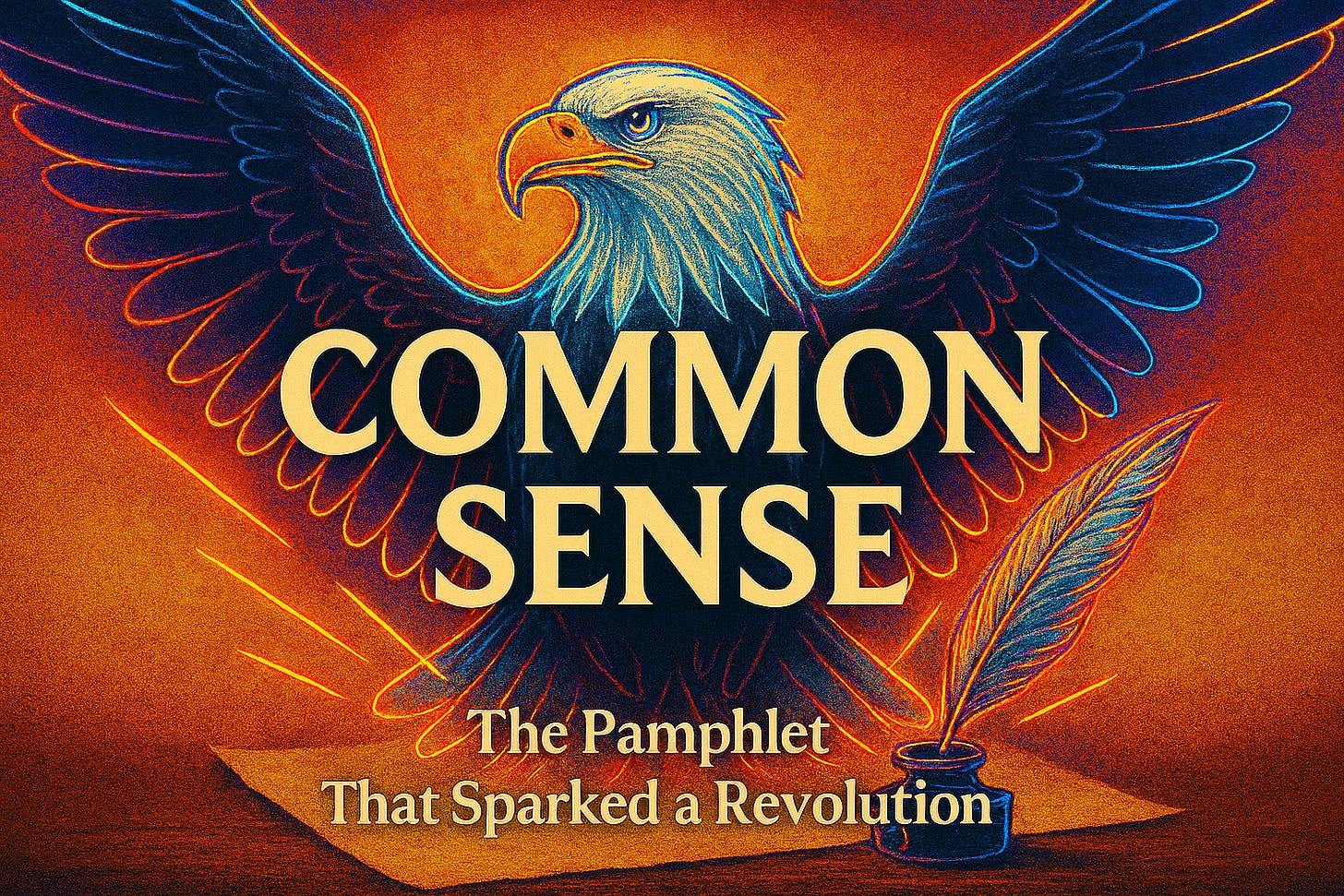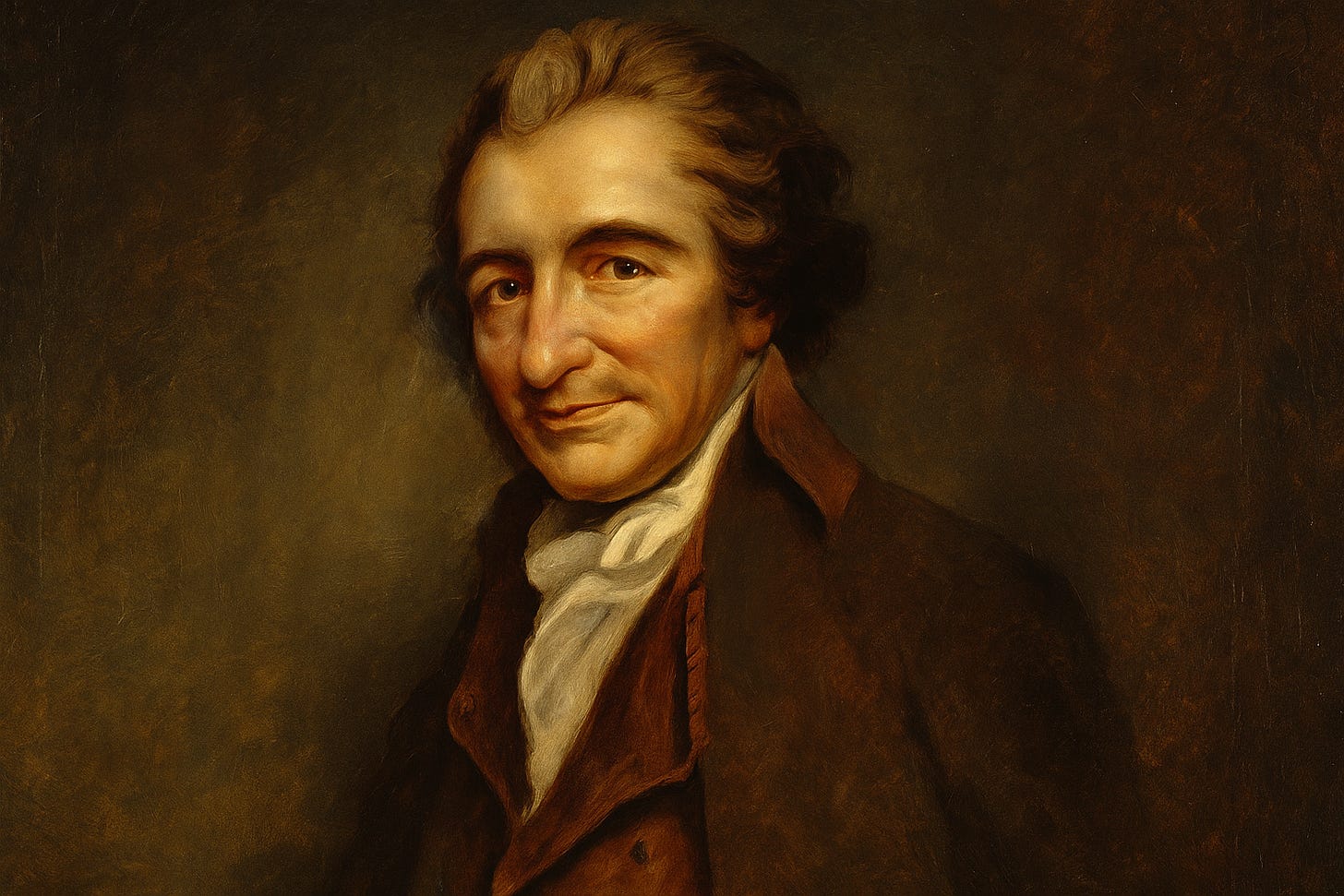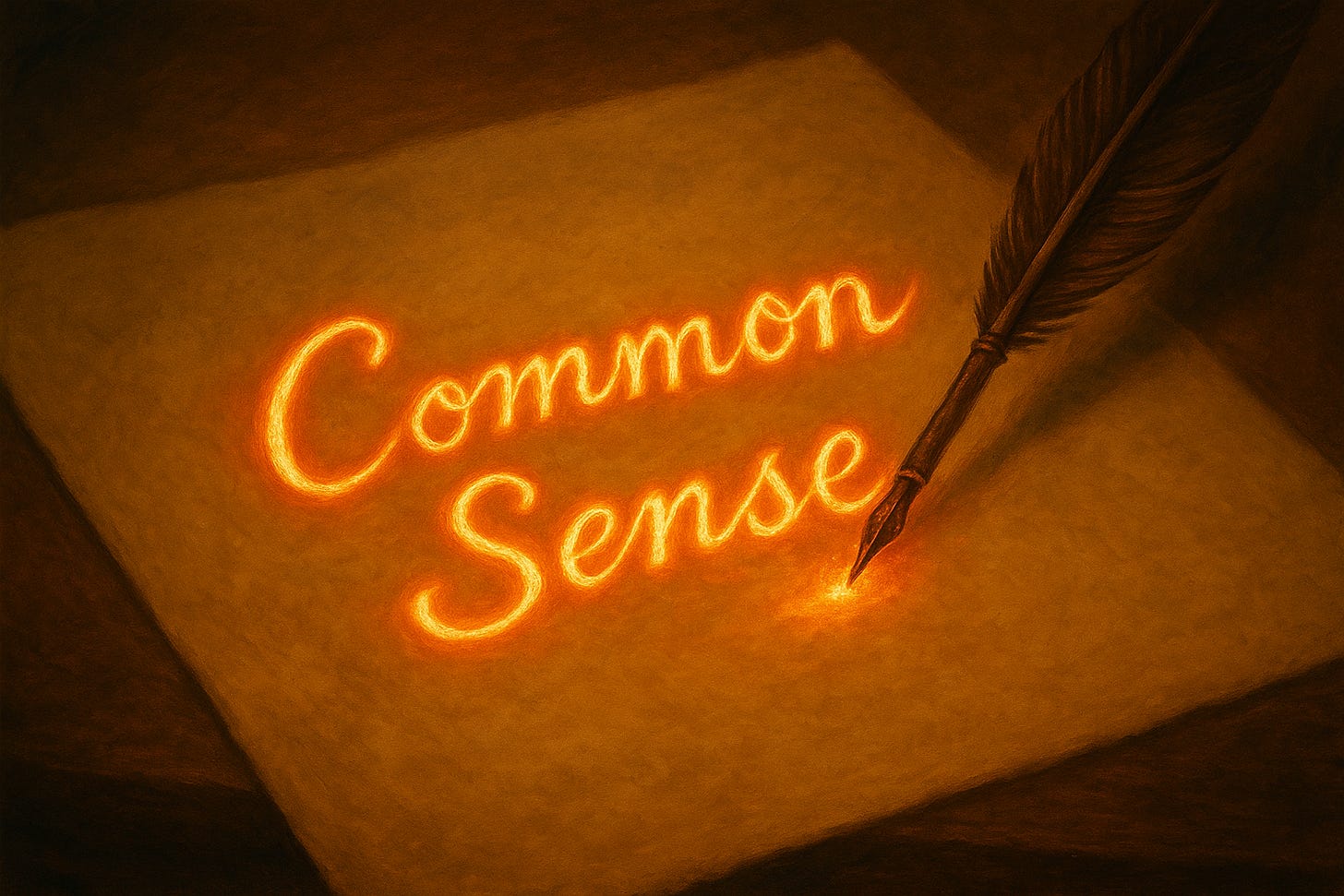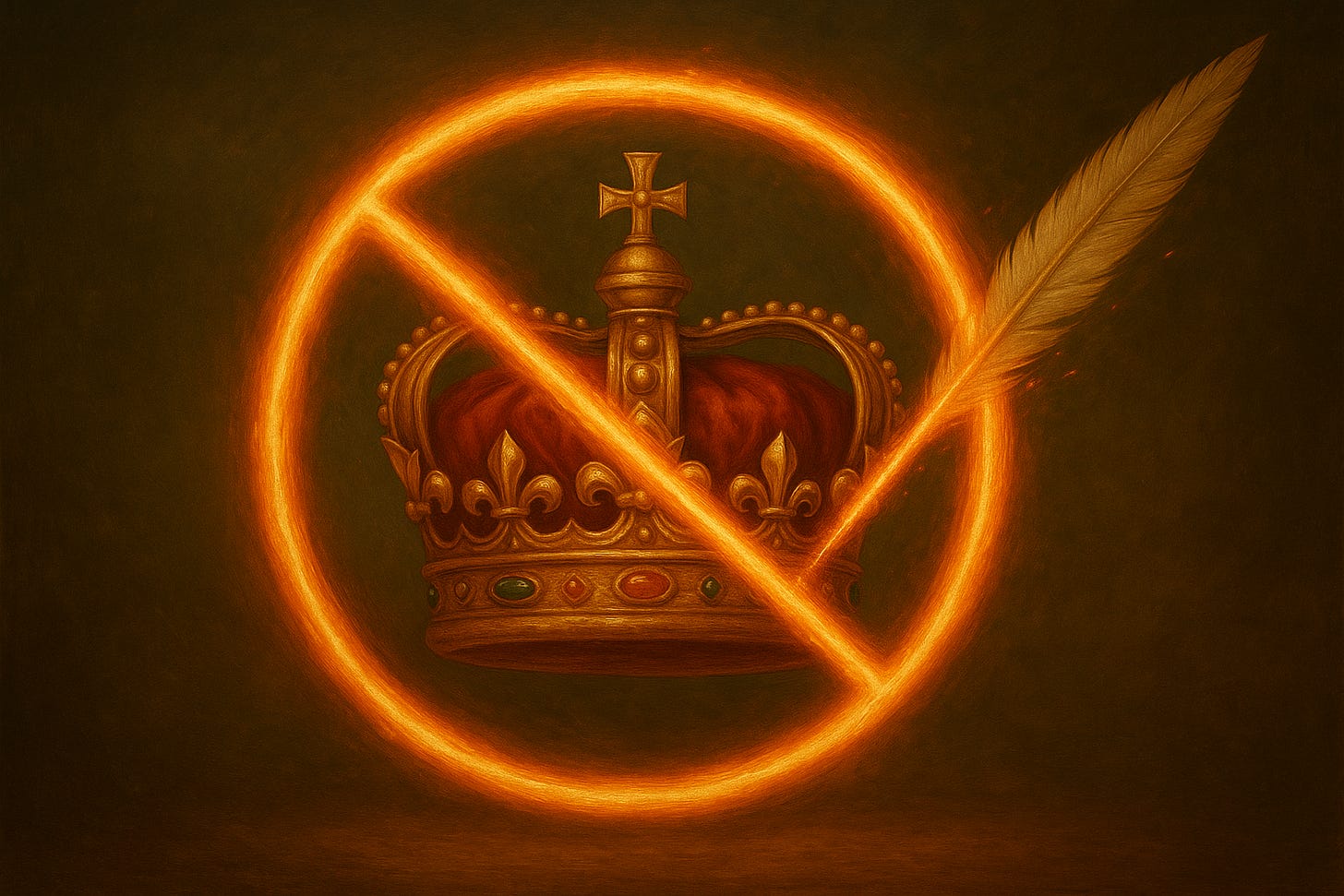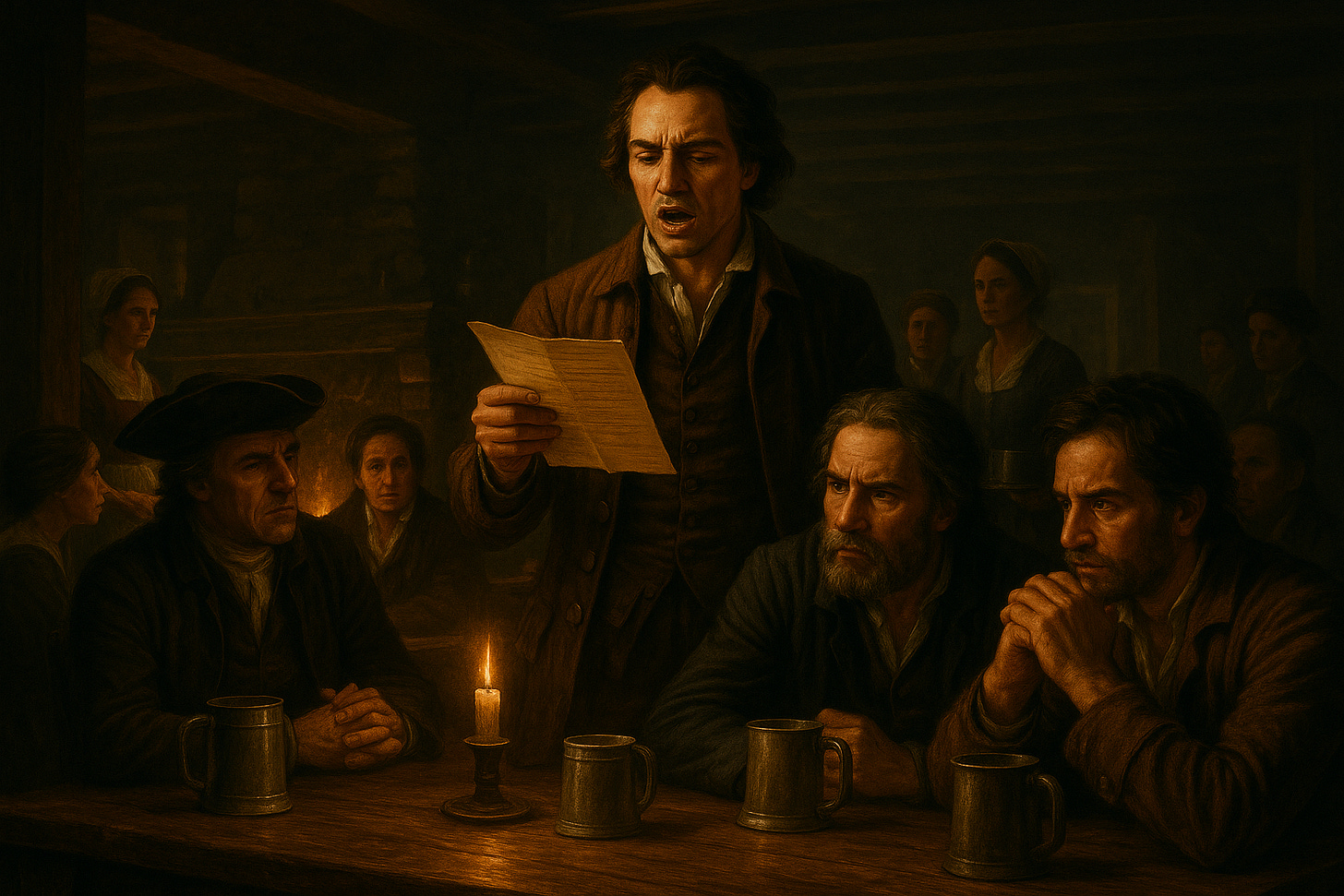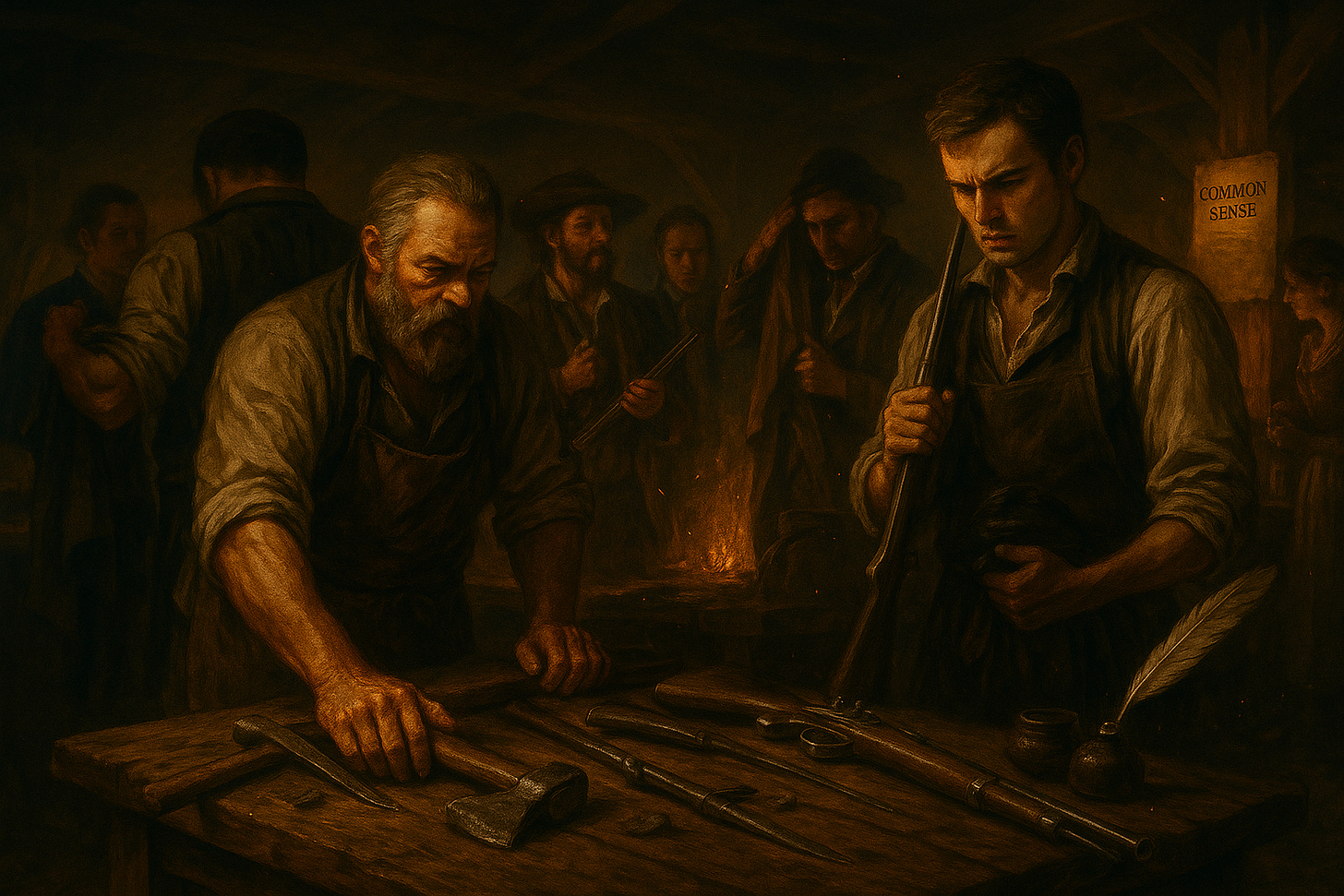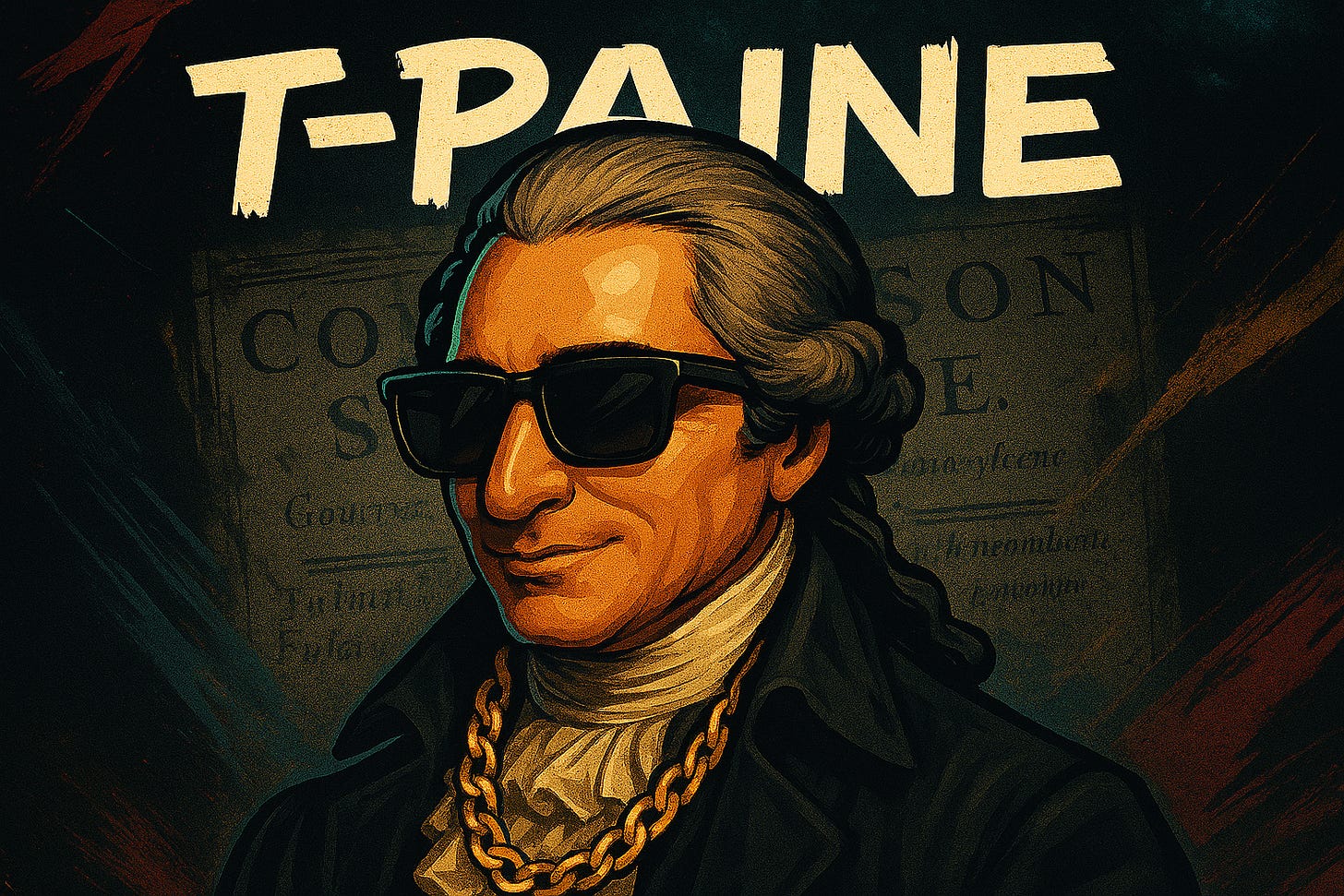It Didn’t Begin With a Battle
It began with a pamphlet.
Not a declaration. Not a musket. Not even a vote.
Just ink and fire on a folded page—
The pamphlet was called Common Sense.
Forty-seven blistering pages, published anonymously in January of 1776, written by a corset maker-turned-tax collector from England—barely two years into his American life. His name was Thomas Paine.
He had no title. No army. No claim to land or legacy.
But he had a pen, and something even more dangerous:
Clarity.
The colonies were cracking. The people were restless. The tea had been dumped, the shots in Boston fired, but the idea of full-scale independence?
Still unthinkable to most.
Some hoped King George might still make things right. Some wanted peace without the price. Others simply couldn’t imagine a world without a crown.
Then Paine struck a match.
Who Was Thomas Paine?
But who was this unlikely revolutionary?
Thomas Paine was an Englishman of humble beginnings— a corset maker by trade, a tax collector by employment, and a political radical by conviction.
Born in 1737 in Thetford, England, he spent his early years struggling through various careers before being inspired by Benjamin Franklin, who encouraged him to emigrate to the American colonies.
Paine arrived in Philadelphia in 1774, just as revolutionary tensions were beginning to boil. His arrival coincided with the First Continental Congress, where colonists began uniting against British rule.
What he lacked in wealth or pedigree, he made up for in fierce intellect and unflinching belief in the rights of man.
His voice—clear, defiant, and unfiltered—would soon echo through history.
But the match didn’t fall on dry ground by accident. Before Paine’s pen struck, tensions from the Stamp Act and Boston’s unrest had already set the stage for rebellion.
Colonial resistance had been building for over a decade— through speeches, protests, and a pamphlet culture that spread ideas faster than British troops could silence them.
Loyalist pamphlets, such as James Chalmers’ Plain Truth, defended the monarchy and warned of anarchy— painting Paine’s voice as dangerous, even treasonous.
A Spark in Plain English
Common Sense didn’t argue. It ignited.
It didn’t persuade with politeness. It punched.
Paine didn’t waste time with academic flourishes or flattering appeals. He wrote like a man who’d lost patience with excuses.
To him, government was a necessary evil. Kings were a fraud. Delay? Just cowardice wearing caution’s clothes.
His prose was clear. His tone, righteous. His logic, relentless.
He made readers feel not just justified in rebellion—but ashamed not to act.
He asked: How can a continent be ruled by an island? He mocked kings who claimed divine right by birth:
“Nature disapproves it, otherwise she would not so frequently turn it into ridicule by giving mankind an ass for a lion.”
Paine’s fire caught fast because he said what others wouldn’t.
And he didn’t make the case from nowhere.
Paine drew from Enlightenment thinkers like John Locke, who argued that all men were born with natural rights—life, liberty, and property— and that governments existed only to protect those rights.
But where others hedged, Paine charged forward.
He took those high ideals and wrote them in the vernacular, making them accessible to farmers, tradesmen, and soldiers alike.
It was a spark anyone could carry.
The Argument That Shook an Empire
Inside the Pamphlet That Lit the Fuse
Paine didn’t just lob ideas—he built a case that exploded in the minds of men who had only half-believed rebellion was possible.
He began where most wouldn’t: by burning the whole thing down.
Government, he said, wasn’t sacred. It wasn’t even good. It was a necessary evil, born from mankind’s worst instincts—not our best. Society, he claimed, was the natural state of man. But government? That was a leash we made for each other.
Then came the monarchy.
Paine took a match to kingship—ridiculing the very idea of inherited power. To him, monarchy was not just outdated, but laughable. Citing both logic and Scripture, he called royalty a cosmic joke—power handed down to men who wouldn’t know justice if it punched them in the jaw.
“One of the strongest natural proofs of the folly of hereditary right in kings,” he wrote, “is that nature disapproves it, otherwise she would not so frequently turn it into ridicule.”
But Paine wasn’t interested in theory alone.
In Part Three, he hit the heart of the matter: Reconciliation with Britain is a fantasy. The king had betrayed his own colonists. Blood had been spilled. There was no going back.
And most damning of all—Britain wasn’t protecting the colonies. It was using them. America was being dragged into foreign wars, shackled by British interests, taxed without say, and governed without care.
Then he turned from indictment to vision.
Paine dared to say it: America could stand on its own. Build its own navy. Elect its own leaders. Write its own laws. He sketched a republic where the people—not kings, not parliaments—wielded power.
“We have it in our power,” he thundered, “to begin the world over again.”
It wasn’t just revolutionary.
It was a blueprint.
A battle plan out of fear and into freedom—one line at a time.
A Cultural Eruption
Estimates suggest that between 100,000 and 500,000 copies were printed in the first year. In a population of 2.5 million, that was a cultural eruption.
That’s not circulation. That’s an idea spreading like wildfire.
Printed by Robert Bell in Philadelphia, Common Sense became a revolutionary artifact.
It spread across the colonies— read aloud in taverns, echoed in town halls, passed from soldier to citizen, preacher to printer.
Farmers read it by lantern light. Soldiers folded it into coat pockets. Preachers thundered its arguments from pulpits.
There was no internet. No broadcast. Just word of mouth and righteous fire on the page.
Common Sense didn’t just spread. It saturated. Its arguments became talking points. Its logic became language. Its vision became shared belief.
And its reach didn’t stop with the masses.
The framers of the Declaration—Jefferson, Adams, Franklin— all felt its impact. They echoed its arguments, sharpened by Paine’s clarity, and leaned into its unapologetic vision of self-governance.
Paine’s radical clarity gave voice to ideas the founders were still wrestling to articulate.
Common Sense broke the mental dam—and the Declaration followed the flood.
By July, America had declared independence.
Paine didn’t just help light the fire. He helped draft the mental blueprint of a revolution.
Why It Worked
Because it wasn’t polite and didn’t wait. Because it didn’t ask.
Paine didn’t write for the aristocrats. He wrote for the farmers, the tradesmen, the soldiers with cold hands and hotter tempers.
He didn’t write in Latin or law-speak. He wrote in truth—truth with calluses.
Paine’s plain speech embodied the philosopher’s duty to truth— a call to align words with integrity.
Still, Paine didn’t traffic in compromise. He trafficked in clarity. In consequences. In courage.
And he proved something powerful:
You don’t need to hold office to move a nation. You don’t need a pulpit or permission. You just need to speak plainly. Speak early. Speak like you mean it.
Because when you do? Truth travels.
Final Transmission
The American Revolution didn’t begin with a gunshot. It began with a sentence.
Not in Congress. Not in combat. But in print.
Thomas Paine had no rank, no title, no land—just resolve on a page and fire in the bones. While others begged the king to listen, Paine told the people to stop asking permission.
And it worked.
Because truth, when spoken plainly and with conviction, has always moved nations.
Many Americans have heard of Common Sense. Fewer have read it. Even fewer have felt it.
Not because it lacks relevance. Because 18th-century prose can slow the fuse.
So we rewrote it.
Not to dilute it—but to detonate it.
The content, sequence, and rhetorical impact remain intact. But now, Paine’s voice speaks in crisp, modern English—so students can read it, teachers can teach it, and modern citizens can feel the urgency that sparked a revolution.
📘 Download the full modern-language edition here: 👉 https://protocolone.gumroad.com/l/CommonSense
It’s free. But you can name your own price to support the project.
And this isn’t just a tribute to the past. It’s a tool for the future.
We’re not just celebrating 250 years since America’s founding. We’re reviving the clarity, courage, and call to responsibility that defined it.
[FIN/ACK]
Transmission Complete
Process Accordingly
—Protocol One
If this drop helped you see history a little clearer, consider buying me a coffee.
Your support keeps these historical insights coming, without the filter of ad dollars or clickbait algorithms.
☕ Support the work: buymeacoffee.com/protocolone
📜 Want to Read the Original?
🖋️ Read Thomas Paine’s original Common Sense via the Online Library of Liberty:
🔗 https://oll.libertyfund.org/pages/1776-paine-common-sense-pamphlet




